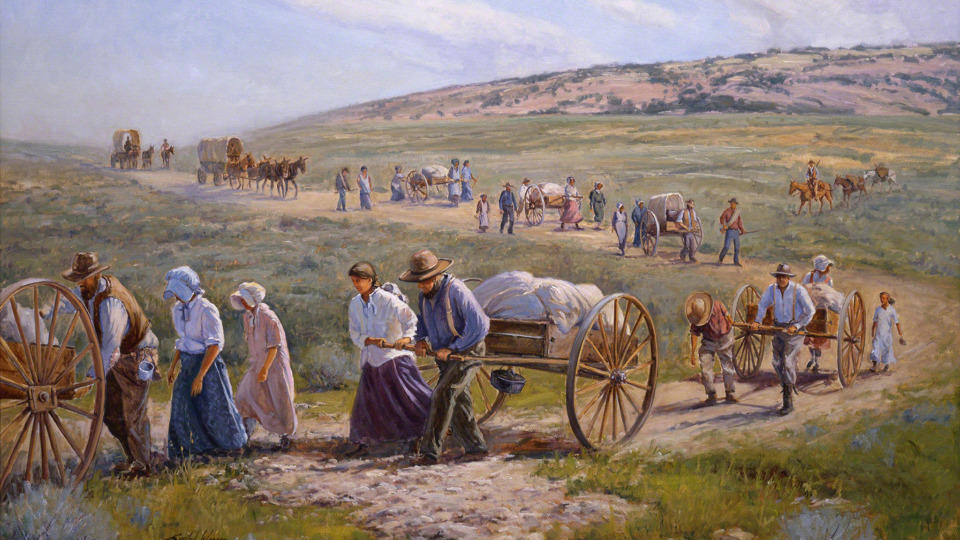
Click to Listen
In the Book of Mormon’s title page, the prophet Mormon informs us that the book is “written to the Lamanites, who are a remnant of the house of Israel.” As I thought about this fact, I wondered what the Lord was trying to tell us by this.
It’s true that Lehi did bless Laman and Lemuel’s posterity that God “[would] be merciful unto [them] forever” and “that they [shall] not utterly be destroyed; but in the end [they] shall be blessed.” (2 Ne. 4:8-9) However, He gave this blessing nearly 1,000 years before the Lamanites completely wiped out or destroyed the Nephites. In the centuries before that, the Lamanites, like their Nephite counterparts, went through cyclical ups and downs in righteous and riotous living. After all of those years, why does God still want us to know about them?
Couldn’t the Lord have inspired Mormon to just write this explicitly to all of the House of Israel without pointing specifically to the Lamanites? Couldn’t He had moved Mormon to focus completely on the covenants and promises He made to Abraham? He could have and it would have been relevant, but He didn’t. I believe it is because the Lamanite story, like many others that our Heavenly Father has given us in the scriptures, has many layers of meaning and application. I’d like to discuss one that is alluded to later on the same title page.
Mormon tells us that he writes to what’s left of the Lamanite members of the House of Israel that they may know “what great things the Lord hath done for their fathers.” Also, he wants them to “know the covenants of the Lord, that they are not cast off forever.”
In the Church, we rightfully point to the lives and sacrifices of the great pioneers who migrated for safety to Utah and who laid the foundation to the marvelous work and wonder of the Restoration of the Gospel. In the state of Utah, every year on July 24th, we commemorate their trek to demonstrate our gratitude for the long-term generational impact that their sacrifices and traditions had on their descendants and the Church.
In light of that, God also knows that many of us, like the Lamanites, have negative habits and beliefs that are based on the traditions of family, friends, and neighbors. Because of these, we may feel like we are “cast off” from God and an outsider at Church. Though He cannot justify or look upon our sins, even those we ignorantly inherited because of these traditions, with any degree of allowance, He mercifully speaks to us the words, “I understand,” “I love you,” “I want to forgive you,” and “I want to help you.”
The Prophet Joseph Smith taught—
God does not look on sin with allowance, but when men have sinned, there must be allowance made for them (Teachings of the Prophet Joseph Smith, pp. 240–41).
When Jesus sat at Simon the Pharisee’s home for a meal, a woman who was known in the town as a “sinner” came behind Him as He ate, knelt down, wept and wiped His feet with her tears and ointment. (Luke 7:36-38) He then taught the Pharisee that “her sins, which are many, are forgiven; for she loveth much.” (v. 47). It’s interesting that even after she heard Him say that to the Pharisee, He had to tell her two more times that “thy sins are forgiven” and “thy faith hath saved thee; go in peace.” (v. 48, 50).
It seems that the woman didn’t initially believe what she heard. Could she truly be forgiven? Was she not consigned as a sinner to be cast off forever? No. He who is not only our Judge, but also our Advocate wanted her to know that He did not condemn but rather forgave her. He knew why she did what she did. He also knew how badly she felt about it. He also knew how much she loved her Heavenly Father. He wanted her to have hope and peace.
Elder Jeffrey R Holland of the Quorum of the Twelve Apostles said—
Surely the thing God enjoys most about being God is the thrill of being merciful, especially to those who don’t expect it and often feel they don’t deserve it.
However late you think you are, however many chances you think you have missed, however many mistakes you feel you have made or talents you think you don’t have, or however far from home and family and God you feel you have traveled, I testify that you have not traveled beyond the reach of divine love. It is not possible for you to sink lower than the infinite light of Christ’s Atonement shines.
Whether you are not yet of our faith or were with us once and have not remained, there is nothing in either case that you have done that cannot be undone. There is no problem which you cannot overcome. There is no dream that in the unfolding of time and eternity cannot yet be realized. (CR April 2012, Saturday Afternoon, “The Laborers in the Vineyard”)
One example of one who was not “cast off forever” is one of the three witnesses of the Book of Mormon, Martin Harris. Most in the Church, unfortunately, only remembers him as being principally at fault for losing the 116 pages of the translated manuscript. As serious of a sin that this was for him and Joseph, it’s interesting that even after this, God called him to not only be a witness of the Book of Mormon gold plates, but also called him to find and to ordain the initial Twelve Apostles of the Church of Jesus Christ of Latter-day Saints (D&C 18:37). Today, one of his descendants, Dallin Harris Oaks, serves as a prophet, seer, and revelator and a member of the First Presidency of the Savior’s Church.
I have a friend who shared with me her journey back to Church. She told me she has loving and kind parents who live the Gospel. When she was in middle school, none of the kids in her ward or neighborhood would be her friend. She told me that this was due to some superficial, physical awkwardness on her part.
She then said that the only kids who would accept her were those who were involved in the wrong things. Soon she found herself doing things she never imagined doing. This led to years of addiction, crime, and potential incarceration that caused her, when she was an adult, to lose her children for a time.
Remembering the great things that God had done for her parents, she turned to Him for help. Believing in His promises that she wasn’t completely “cast off,” she leaned heavily on His word. Through much prayer and struggle, He freed her from her addictions, guilt, and shame. She told me that for many years now, her faith and feet have been firmly placed in Christ and on His covenant path. She was never going back.
It’s fitting that Alma the Younger who was once threatened by God through an angel that he would be “cast off forever” (Mosiah 27:16) spoke after his conversion about the Savior’s ability to “blot out our transgressions according to the power of his deliverance.” (Alma 7:13) The phrase “blot out” means to “wipe out” or “destroy.” (Merriam Webster Online Dictionary) Alma appreciated the Master’s power to wipe out or destroy his sins and the sins of all of God’s children.
As we read the Book of Mormon, let us remember that the promises of the Lamanites are extended to all of us who seek to come to Christ through faith in Him, sincerely repent of our sins and submit completely to His will. When we feel alone, anxious, and sad about our circumstances, please know that even though our family may not understand, our friends may not understand, and our priesthood leaders may not understand, our Father in Heaven and Savior completely understand. Our Elder Brother, who is our Redeemer, can and will deliver us from feeling and being cast off. Because He is full of grace and truth, His merits and mercy make it possible for us to hear and to know as Enos did, “thy sins are forgiven thee, and thou shalt be blessed.” (Enos 1:5). My hope and prayer are that we will.
